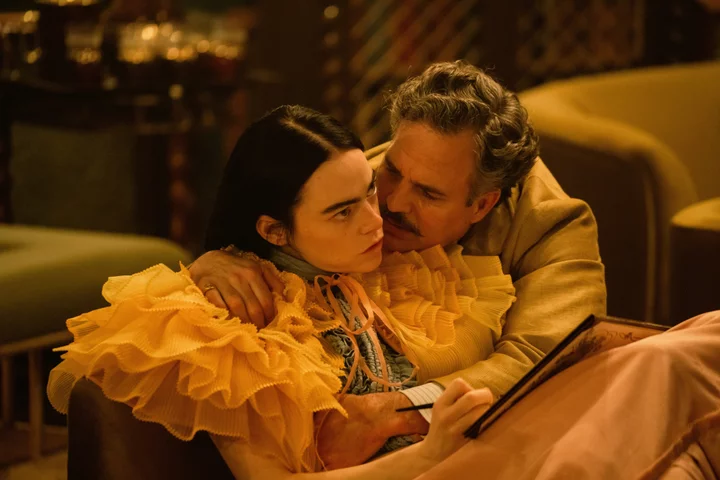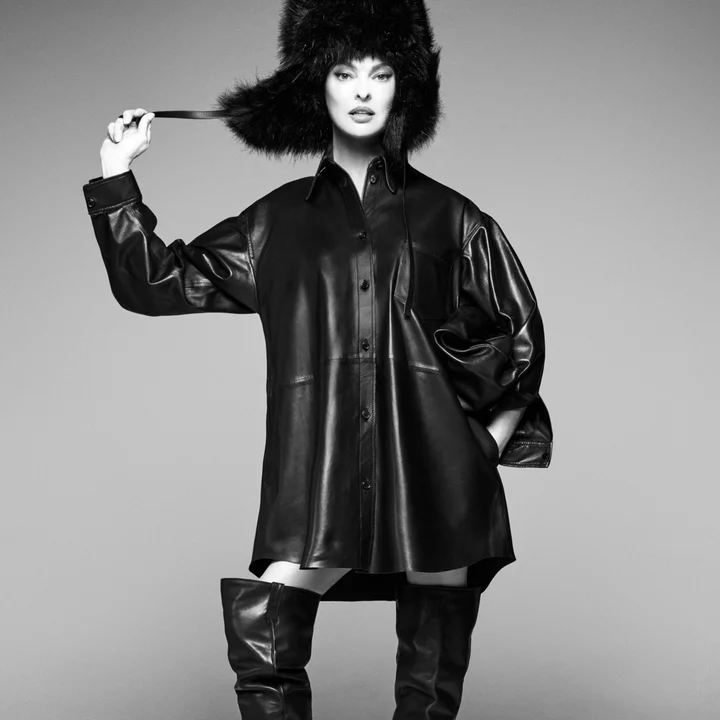"It is a happy tale," promises a disfigured Willem Dafoe in the first act of Poor Things. But those familiar with Yorgos Lanthimos's other films might well doubt that, with good reason.
The acclaimed Greek writer/director has constructed a reputation for films complex and comical, but also chilling. Among them are the absurdist romance The Lobster, in which lonely people are forcibly transformed into animals; The Killing of a Sacred Deer, wherein a surgeon is plagued by a peculiar and pernicious teen seeking vengeance; and The Favourite, an Academy Award-winning film in which Emma Stone plays a social-climbing brat who uses a suffering queen as a ladder. (And those are just his most accessible films; as part of the "Greek Weird Wave," his older films, like Alps and Dogtooth, are even more viscerally unsettling.) As Lanthimos and Stone reunite in Poor Things, he has indeed delivered a legitimately happy tale — albeit one with his signature sense of humor.
What's Poor Things about?
Willem Dafoe is mad scientist Dr. Godwin Baxter. Credit: Yorgos Lanthimos / Searchlight PicturesAdapted from Alasdair Gray's novel of the same name, Poor Things is essentially a reimagining of Mary Shelley‘s Frankenstein, wherein the resurrected corpse is that of a woman (Stone) who died by suicide, her body a perfect vessel for the curiosity of mad scientist Dr. Godwin Baxter (Willem Dafoe). Much to his surprise, this beguiling girl he dubs Bella Baxter becomes more than an experiment to him; she becomes a daughter of sorts. Theirs is a bond forged by science but blossoming in sincere mutual adoration. However, Bella is growing up fast. Though she has the body of an adult, her mind begins as that of a child. As such, she is full of extraordinary potential and hungry for both knowledge and experience.
More swiftly than her father would like, she begins to yearn for what lies beyond the humdrum confines of the Baxter home, which is literally shot in black and white. When a lusty rogue (Mark Ruffalo, absolutely sublime in his sleaziness) offers to show her the wider world, she jumps at the chance — and all the curious opportunities that follow. As Bella sets forth, her world bursts into color. On their voyages, she finds cities of aqua and gold, with pink skies and lush greenery. Bella herself is oft bedecked in sickly pale blues and vivid but slightly nauseating yellows. And that's a virtue, not a glitch.
Poor Things relishes in the putrid and the pretty.
The Baxter family at home. Credit: Atsushi Nishijima / Searchlight PicturesThrough this lens, Poor Things becomes a coming-of-age story that radiantly reflects a young woman growing to understand herself as a creature of intelligence, sexual desire, and autonomy. While the origin of the film is the birth of horror itself, Lanthimos's Poor Things has a lovely aesthetic that pulls its pastels from surprisingly grim sources. At the film's press screening at the New York Film Festival, production designers Shona Heath and James Price and costume designer Holly Waddington revealed that their color choices were plucked from anatomy books, reflecting the hues of veins, blood, and bile. This might sound repulsive on the page, but in execution it is glorious — while still feeling a wee bit gross.
When the Poor Things designers explained their inspiration, a puzzle piece of the film clicked into place for me. Life and death are intricately intertwined in the film, just as the repulsive colors of the body's innards are to Bella's widening world. Coolly, Lanthimos leaps from Bella's galavanting back to lonely Godwin's dissection exhibitions. Both are experimenting — one in life lessons, the other on corpses. With this perturbing palette, Lanthimos and his team remind us that no matter how far she travels from home, Bella is tied to Godwin (or God, as she calls him) and destined to return. Beyond the literal, this also speaks to death itself: her origin and her eventual end. And yet Poor Things will not get caught up in the gloom of its own meditation on mortality, for this is a happy tale.
Poor Things is almost alarmingly joyful.
Bella muses. Credit: Atsushi Nishijima / Searchlight PicturesIn Bella's journeys, she discovers not only the pleasures of food and flesh and intellect, but also dark lessons on jealousy, misogyny, and mortality. However, Lanthimos keeps the overall tone light. Part of it is the score from Jerskin Fendrix, which frolics in the eerie sound of synth chords and perhaps a theremin. Part of it is Lanthimos's shame-free embrace of Bella's sexual exploration. While social media may harumph over onscreen nudity and the need for love scenes, Lanthimos and Stone showcase an array of gleefully sexual and even silly scenarios, involving fetish gear, full-frontal nudity, bisexual lust, and much "furious jumping." While some characters in Poor Things rush to deride Bella for her explorations, she shrugs them off, urging us to do the same. Her choices may not be for everyone, but they are her choices.
Curiously, within all this sex, there isn't much wetness to be found. Unlike Saltburn, which relished in the fluids of the human body, Poor Things keeps these things purely as a vision board for its color palette. Some might call this a cop-out on Lanthimos's part, by romanticizing the sexual maturity of cis women without squicking out viewers who might blanche at menstrual blood. However, I found this bespoke dryness to be in line with the film's sense of storybook whimsy. Unlike Frankenstein's monster, Bella is not a cross-stitched collection of rotting body parts. She is an unquestionably and impossibly exquisite corpse. Likewise, the other animals Godwin has experimented on are adorably conjoined, like a goat's body with a duck's head or a chicken's body with a pug's head.
Rather than a cowardly ducking of the grislier aspects of sex and maturing bodies, Lanthimos seems to embrace this a picture-book perspective that reflects how Bella sees her own life. To her, guts and bile are not grotesque. They are the tools of her father's trade. Their colors are not repellent but worth celebrating. Her stitched-up cohorts are as lovely to her as the much-scarred face of her God, whom she accepts as readily as she does every new discovery about her sexuality.
Emma Stone is a force of nature as Bella Baxter.
Emma Stone is coming for your neck. Credit: Atsushi Nishijima / Searchlight PicturesThis is a role that could have easily become a hammy feast in the wrong hands, but in Stone's it is divine. Early on, her physicality is wobbly but determined, like a toddler's. Over the course of the film, she develops a stronger gait but keeps a wide-leg stance and slight shuffle, a visual reminder of how far she's come in a short amount of time. Her arms flail excitedly, with no concern about society's conceptions of grace or femininity. Her face twitches with the experimentation of mimicking others and finding herself at a loss.
While adults are typically socialized to bend their bodies and constrain their faces to appropriate behaviors, actors are made through their craft even more aware of how their countenances and physicality communicate. Bella's spinning giddily on a dance floor is an abject rejection of the swaggering cool of a red carpet. Stone manages this portrayal with ease and a seeming exaltation in the freedom of this expression. That exhilaration is contagious, surging into the audience to sweep us away in the vicarious thrill of self-discovery.
As Bella matures, these rough edges are sanded down a bit. However, Stone doesn't surrender fully to the oft-spoken demands of "polite society." Even as Bella learns to play the game of small talk and to pacify thundering male egos, there's an open defiance in the forthrightness of her stare. And in this, too, there is an electrifying thrill, for this woman who has already died does not fear death like we do. In an unexpected way, Bella Baxter gives female audiences a darker spin on the Barbie fantasy. This is also a world where a young woman may be anything while dressing as loud and weird as she wants, and her reward will be up to her, not a tedious patriarchy with rules that never understood or suited her needs.
Mark Ruffalo is outstanding as Poor Things' hunky bastard.
Mark Ruffalo in "Poor Things" knows exactly the effect he has on women. Credit: Yorgos Lanthimos / Searchlight PicturesThere is an embarrassment of stellar supporting players in Lanthimos's latest. Dafoe is tender and unflinchingly bizarre as the mad scientist who spouts poetry and bubble belches with equal panache. Ramy Youssef is endearing as Bella's first besotted suitor. Margaret Qualley is delightful as an unexpected friend, and Christopher Abbott plays a sensational bully. Jerrod Carmichael brings a sly smile and a cutting wit as a self-pronounced "cynic," while Hanna Schygulla plays an "interesting old woman" who is giving all kinds of enviable Golden Girls attitude. But as the big-talking, horny, and hot-as-hell Duncan Wedderburn, Mark Ruffalo runs away with this movie.
He had me from that first outraged "Ow!" in the trailer, but in the whole, Ruffalo is marvelous. Freed from the family-friendly constraints of Disney's MCU, he thrusts himself fully into the role of this devil-may-care rascal. There's a mischievousness in his twinkling eyes that is undeniably exciting. A playfulness in his delivery of double entendres and flat-out outrageousness that is wickedly entertaining. In Duncan's seductions of Bella, Ruffalo huffs with a musky yearning so powerful you can almost feel his breath. But even as his rogue shifts gears from charming to a chore, Ruffalo makes him a hoot. A reenactment of Marlon Brando's cry from A Streetcar Named Desire might feel a bit out of place, even in a Victorian-set tale packed with hi-tech anachronisms. But Ruffalo owns this bellow with his full chest, and so makes every quip, pick-up line, and whimper sing.
With roughly 300 supporting players in the highly regarded Oppenheimer, the Best Supporting Actor race this year might be more competitive than ever before. But it would be utterly absurd if Ruffalo doesn't at least get a nomination.
Poor Things offers a simple story, beautifully and bizarrely told.
Despite its eccentricities, the narrative of Bella Baxter is pretty straightforward. But that is not a failure. Within that simple and familiar structure, screenwriter Tony McNamara (The Favourite, The Great) has once more concocted incredibly vivid characters fueled by passion and felled by hubris, who are alive with a humor both dark and delicious.
Lanthimos and his team have built a film that is gorgeous and a bit gross, but ultimately defiantly jubilant. Poor Things — like Saltburn and Dicks: The Musical — is a comedy that revels in the collision of the sacred and the outrageously irreverent. Here, this is done within the winsome whimsicality of a fairy tale, electrified with a fearless eroticism and emotional fervor. Stone, Ruffalo, and the rest of the film's awesome ensemble embrace this colorful and wild world, inviting us to join them on a journey studded with pain and pleasure. Because life is short, so live while you can.
In the end, Poor Things is an awe-striking visual feast that satisfies the eyes, tantalizes the loins, and feeds the soul. Bravo.
Poor Things was reviewed out of the New York Film Festival; the movie opens in theaters Dec. 8.









